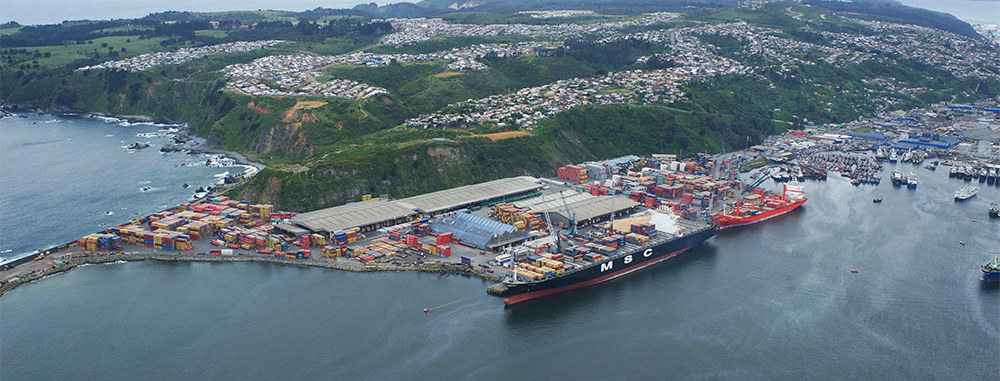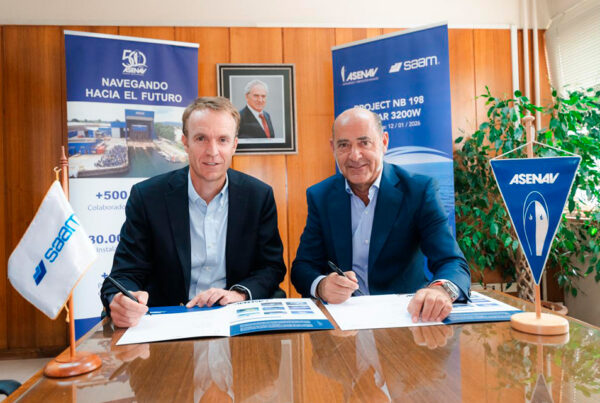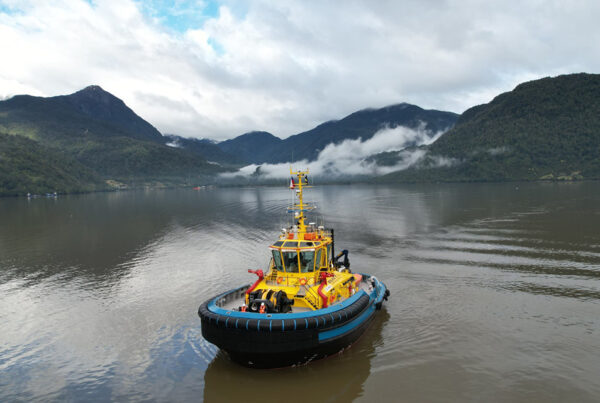
• This figure represents a 12.9% growth with respect to the previous exercise, having been driven by the positive results shown by the Tugboats and Port Terminals Divisions.
Santiago, March 4, 2016. SAAM showed a positive balance for the year 2015, period during which it obtained profits for US$68.9 million. According to Company reports, considering jointly its consolidated financial statements and the results obtained by its business affiliates at their proportional value, with respect to 2014, total sales experienced a slight decline of 3%, reaching US$748 million, while Ebitda rose 11%, totaling US$203 million.
To achieve these figures, the 4th quarter of 2015 contributed sales for US$180 million
(-10%), an Ebitda of US$46 million (-8%) and earnings for US$32 million (+31.5%).
“Results for 2015 were positive, despite the complex global macroeconomic context and restructuring of the shipping industry, which demands a significant part of the services we provide. In this scenario, not only did we achieve good figures, but we were also able to strengthen the links with our Partners and consolidate our leadership position in the region”, stated Javier Bitar, SAAM’s CEO.
The year was marked by the consolidation of the alliance with Boskalis in the Tugboats Division, which generated synergies for over US$15 million, thus exceeding by far the initial projections.
In addition, there was the strengthening of Tramarsa, in Peru. Through an operation that implied reducing SAAM’s participation in said company, from 49% to 35%; it was agreed with local partners to transfer a strategic asset to the business portfolio of the partnership: Terminal Internacional del Sur (TISUR), the third principal port of the neighbor country. Furthermore, this agreement generated an extraordinary net income close to US$32 million.
2015 Results by business divisions
The Port Terminals Division recorded an annual growth in sales amounting to 4% (US$ 245 million) and Ebitda rose by 14% (US$ 71 million), thus managing to compensate the net loss of services derived from the restructuring of the shipping industry and, in Chile, the days lost due to recurring heavy seas in the country’s coast and the stoppages occurred in the terminals of Iquique (ITI) and Antofagasta (ATI).
Among the period’s milestones that will have a long-term effect on this business area, we should mention the ten-year extension (extendable to 20) of the Florida terminal concession (FIT) in the United States, and the start of the transfer of vehicles through the Mexican port of Mazatlán and the advances in the extensions of Chilean terminals of San Antonio (STI), and San Vicente (SVTI), as well as of the Guayaquil terminal (TPG) in Ecuador. Furthermore, in 2015 significant investments were made in state-of-the-art equipment, among which should be mentioned the acquisition by STI of two new Ship To Shore Super Post Panamax cranes, and the arrival at ITI of two mobile Super Post Panamax cranes
On the other hand, the Tugboats Division recorded sales for US$280 million (1% lower than in 2014) and Ebitda was US$102 million (19% higher), result explained to a great extent by the achievements of the two joint ventures (JV) agreed with the Dutch company Royal Boskalis. Brazil’s JV, merging the operations of both companies in said country, reached extraordinary synergies, and the JV created to serve jointly Canada, Panama and Mexico, achieved significant renewals in the latter market (Lázaro Cárdenas, Veracruz and Altamira). Furthermore, the process of strengthening the fleet of the whole division began, with the construction of eight new, last generation, tugboats, which will enable consolidating SAAM’s leadership as the fourth world operator in this category.
The Logistics Division experienced a drop in its sales to US$224 million (13% less than in the previous period) and Ebitda dropped to US$29 million (14% lower than in 2014).During the period, this business area made significant progress in its process of adapting to the new business model of the shipping industry, which has reduced the margins in the services it demands and has even generated losses in some specific operations. Because of the above, container depot and workshop operations were closed in Brazil and some services to ships were reduced in the Chilean central zone.
On the contrary, Logistics achieved some positive returns from the business started in Montes del Plata (Uruguay), while Aerosan managed to overcome the economic downturn that affected foreign trade and achieved similar results to those of 2014. In Chile, considerable steps were taken towards developing the 3PL or Contract Logistics business: a team of specialized professionals was put together, the infrastructure intended for this segment was adapted, and a series of pilot contracts were entered into to provide comprehensive services in the logistics chain of import and export customers.





